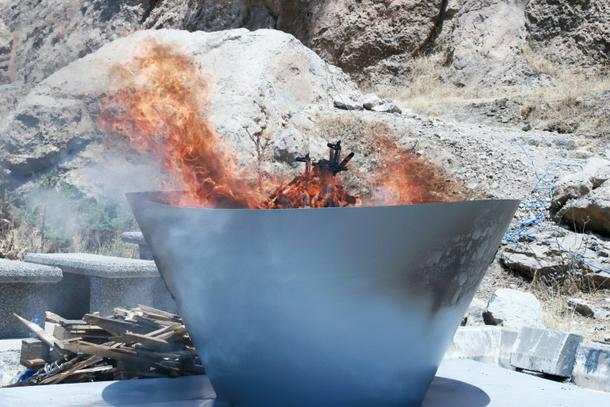
A first group of PKK militants burnt their weapons at a symbolic ceremony in northern Iraq
Sulaimaniyah (Iraq) (AFP) - Thirty PKK fighters destroyed their weapons at a symbolic ceremony in Iraqi Kurdistan on Friday, two months after the Kurdish rebels ended their decades-long armed struggle against the Turkish state.
The ceremony marked a major step in the transition of the Kurdistan Workers’ Party (PKK) from armed insurgency to democratic politics as part of a broader effort to end one of the region’s longest-running conflicts.
Analysts say that with the PKK weakened and the Kurdish public exhausted by decades of violence, Turkey’s peace offer handed its jailed founder Abdullah Ocalan a chance to make the long-desired switch away from armed struggle.
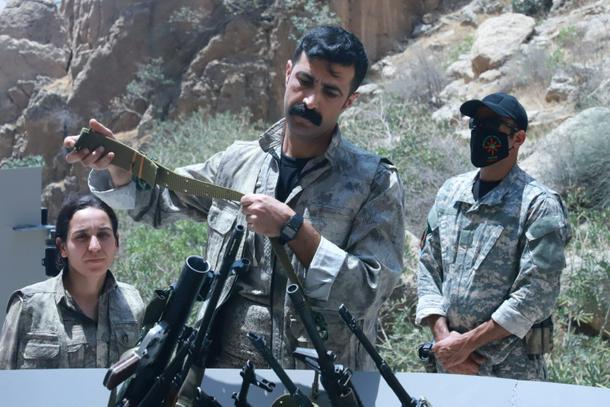
Thirty PKK militants, their faces uncovered, lined up outside an ancient cave at the foot of a mountain in Iraqi Kurdistan and put their weapons into a giant fire pit which was then torched
The PKK’s disarmament also grants President Recep Tayyip Erdogan the distinction of being the Turkish leader who managed to draw a line under a conflict that has cost more than 40,000 lives and wrought havoc in Turkey and beyond.
Outside the ancient cave of Casene, a group of 30 PKK fighters, men and women, gathered on a stage in khaki fatigues, their faces uncovered, in front of an audience of around 300 people, an AFP correspondent reported.
One by one, they walked down to lay their weapons in a cauldron in which a fire was lit. Most were rifles but there was one machine gun and a rocket-propelled grenade launcher.
As they looked on, people in the crowd started cheering while others could be heard weeping.
After the ceremony, the fighters returned to the mountains, a PKK commander said.
- Ocalan’s freedom ‘essential’ -
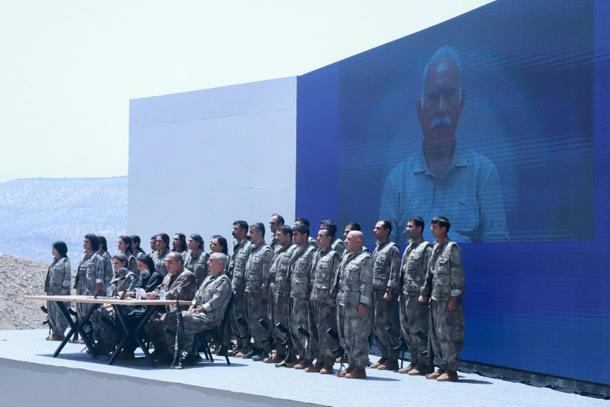
Standing under a giant screen showing a picture of the PKK's jailed founder Abdullah Ocalan, the fighters read out a statement before laying down their weapons
Speaking to AFP after the ceremony, the PKK’s top female commander Bese Hozat said that for the process to succeed, it was essential to release Ocalan – known to his followers as ‘Apo’ – who has been serving life in solitary confinement since 1999.
“Ensuring Leader Apo’s physical freedom via legal guarantees is essential… he should be able to freely lead and manage this process. This is our primary condition and demand,” she said.
“Without this development, it is highly unlikely that the process will continue successfully.”
Erdogan hailed the ceremony as an “important step” on the path to a “terror-free Turkey”, expressing hope it would lead to “the establishment of lasting peace in our region”.
A senior Turkish official source described it as “an irreversible turning point”, saying the move to decommission weapons was part of a broader process that would ultimately involve the legal return of former fighters and their reintegration into society.
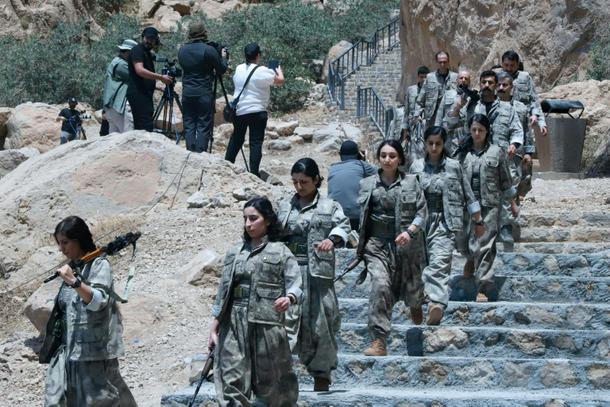
Half of the fighters were men and half women, their faces uncovered as they came forward to deposit their weapons in a giant conical fire pit set up on the stage
PKK militants have insisted on the need for legal reform in Turkey to allow them to return home and engage in democratic politics, commander Hozat told AFP.
“If Turkey… enacts laws and implements radical legal reforms… we will go to Turkey and engage in politics,” she said.
“If there is no legal constitutional arrangements, we will either end up in prison or being killed.”
- ‘New era’ for Kurds -
Turkey’s pro-Kurdish DEM party, which played a key role in facilitating contacts between Ocalan and Ankara, hailed the ceremony as the start of a “new era for the Kurdish issue”.
It also filed a legal petition for the release of former top pro-Kurdish politician Selahattin Demirtas, who was jailed in 2016 and sentenced last year to 42 years for his alleged role in a series of deadly 2014 protests.
France’s foreign ministry said it welcomed Friday’s ceremony, adding it hoped the PKK’s dissolution would “be effective and verifiable”, bring an end to the violence, and “give rise to an inclusive political process”.
The PKK took up arms in 1984, beginning a string of bloody attacks on Turkish soil.
But more than four decades on, the PKK in May announced its dissolution and said it would pursue a democratic struggle to defend the rights of the Kurdish minority in line with a historic call by Ocalan.
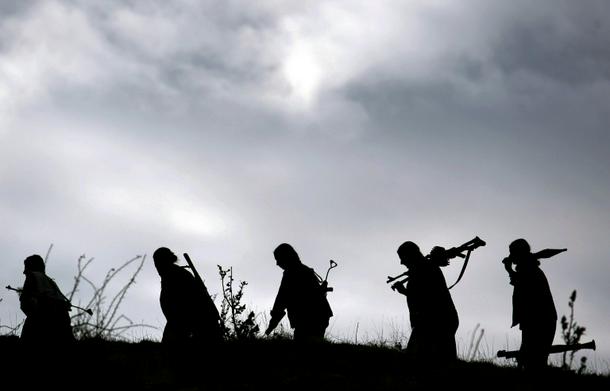
Most of the PKK's fighters are based in the mountainous regions of Iraqi Kurdistan
Earlier this week, Ocalan said the disarmament process would be “implemented swiftly”.
In recent months, the PKK has taken several historic steps, starting with a ceasefire and culminating in its formal dissolution announced on May 12.
The shift followed a historic appeal at the end of February by Ocalan, 76, who has spent the past 26 years behind bars.